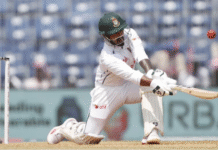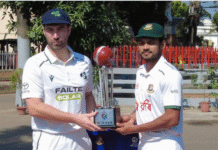
How many people are watching the ongoing 11th Bangladesh Premier League (BPL) is a difficult question to answer.
To answer this, one would have to know how many tickets have been sold, a figure the Bangladesh Cricket Board (BCB) does not officially disclose, would have to rely on TRP figures, which industry insiders in the country don’t consider wholly reliable and also know how many people are tuning in through legal and illegal streaming sites, which would require a team of dedicated internet whizzes to find out.
Still, however complex, a person with the right connections, who is willing to pull out all the stops could in theory find the right answer.
But that same fictional person of great tenacity and resolve would wave the white flag and surrender if asked to answer a follow-up question: How many of them enjoyed watching the BPL?
Bangladesh’s premier franchise competition has seriously lacked in the star quotient this season, with most top players preferring SA20 and ILT20 over it and the absence of high-calibre players has led to lacklustre action on the field.
On top of that, reports of players – local and foreign – saying their dues have not been cleared, cheques paid to players bouncing more than the ball in Mirpur and a franchise owner’s outrageous claim of not paying a player because of not being ‘satisfied’ with his performance, have made it even more difficult for the masses to enjoy the action on the field.
Still, there are thousands of cricket fanatics in Bangladesh who have showed up at the venues and tuned in on screens to watch the BPL this season. They are the true fans, the lifeforce of Bangladesh cricket.
If somehow, those fans could be lined up and asked another question: Would you continue watching if you knew there is fixing in the BPL, what do you think their answer would be?
Lambert’s ban and cricket’s betting roots
By any chance, have you heard of a cricketer named William Lambert?
No, he is not one of the many hardly-known overseas cricketers currently plying their trade in the running BPL.
Lambert was an English cricketer who played for numerous County clubs back in the 1800s. Considered one of the finest batters of his generation, Lambert is the first man in recorded history to hit two centuries in the same match for Sussex against Epsom at Lord’s back in 1817.
However, cricket history does not remember him fondly for his many on-field achievements. Instead, Lambert is and will always be remembered as the first cricketer ever to be banned for match-fixing.
Betting has been a part of cricket for almost the entire length of the game’s existence. In the late 1700s, when cricket was still taking shape as a sport, English aristocrats used to sponsor cricket teams and arrange matches between each other, where often huge sums would be wagered.
Almost from the get-go, there were accusations of players getting paid to underperform and teams intentionally losing, but till 1817, no cricketer was formally reprimanded for it.
But by that time, the Marylebone Cricket Club(MCC) had had enough. To preserve the integrity of the game, it dished out a lifetime ban on Lambert for deliberately underperforming while playing for England against Nottinghamshire.
The interesting thing about that decree was that Lambert never confessed his crime nor was there any hard evidence against the batter, only rumours that refused to die down.
Some cricket historians feel that the MCC wanted to make an example out of Lambert, who might have just had a bad match for England and done nothing wrong.
Akram’s narrow escape and reality of fixing in modern cricket
“Once this commission looks at the allegations in their totality, this commission feels that all is not well here and that Wasim Akram is not above board… It is only by giving Wasim Akram the benefit of the doubt after Ata-ur-Rehman changed his testimony in suspicious circumstances that he has not been found guilty of match-fixing. He cannot be said to be above suspicion.”
This is part of a report submitted by the Qayyum Commission to the Pakistan Cricket Board (PCB) back in 2000. The PCB had formed the commission to investigate the many allegations of match-fixing that had plagued its national men’s team throughout the 1990s.
Many big names of the star-studded Pakistan team were investigated by the commission, the biggest of them all was Akram.
Akram was accused of throwing matches, pressuring some players to underperform in certain games, keeping contact with bookmakers and feigning injury to not play the quarterfinal of the 1996 ODI World Cup against India.
His teammates like Javed Miandad, Rashid Latif, Aamer Sohail and Aaqib Javed accused Akram of being involved in match-fixing. Still, the commission felt the evidence against the pacer was not conclusive enough, especially, after Ata-ur-Rehman who at first had accused Akram of paying him to bowl poorly in a match, flipped his statement during the hearing.
The commission, however, did not give Akram the clean chit by any stretch, imposing a PKR 300,000 fine on him and saying Akram had ‘sullied’ his reputation and should not be allowed to lead Pakistan ever again.
The Qayyum report came to light about 183 years after the MCC imposed that ban on Lambert. Cricket by that time had evolved into a global game and reprimanding a national team player for something as scandalous as match-fixing had much bigger ramifications.
That’s why in Lambert’s case, mere suspicion was enough for the MCC to decree a ban, but for Akram, the commission demanded irrefutable evidence for conviction, which was not available.
This change is perhaps for the better as in the eyes of the law everyone should be innocent until proven guilty. But, it would be foolish to not see how it could lead to guilty players and bookmakers slipping through the fingers of justice.
From match-fixing to spot-fixing
Before the 2000s, the discussions over fixing in cricket would mostly centre around match-fixing. But currently, world cricket is much more concerned with spot-fixing.
People often use match fixing and spot fixing interchangeably, but they are different things.
In match-fixing, the outcome of the match is fixed. Meaning, that bookmakers would have to collude with players, management and sometimes even match officials to ensure they get their intended result.
Meanwhile, spot fixing is much simpler as it usually involves one player doing some predetermined thing at a definite period of the game and it does not necessarily affect the final outcome.
Cricket is almost the perfect game for spot-fixing. In a game where every delivery is a separate event, the avenues to place bets on are aplenty.
Although in Bangladesh betting on sports is illegal, anyone can easily access numerous online betting sites without needing to use VPNs and see how many different categories there are to place bets on.
The sheer volume of online betting and the mushrooming of franchise leagues have made keeping corruption in check in cricket a taxing task.
It’s not like the Anti-Corruption Unit (ACU) of the ICC has been sitting idle. Every few months, news of some players, officials or bookmakers getting reprimanded comes into view. But chances are, that the fixing charges uncovered are just the tip of the iceberg.
The BPL conundrum
“The Party told you to reject the evidence of your eyes and ears. It was their final, most essential command,” is a quote from the celebrated dystopian novel ‘1984’, penned by George Orwell.
The book is set in a fictional world where ‘The Party’ led by the omnipresent ‘Big Brother’ controls every aspect of its citizen’s life, it controls the past and present and most importantly wants its citizens to deny the evidence of their senses and believe only what ‘The Party’ tells them to believe.
In the text, even after using all of its might, ‘The Party’ comes across individuals who reject its doctrines, which shows how difficult it is to make people reject their inherent logic.
And that’s where the matter stands at the moment when it comes to spot-fixing in cricket.
Players, both current and former, coaches, media and fans are having a difficult time ignoring what’s happening in many leagues across the world, and unfortunately, the ongoing edition of the BPL has been one such tournament so far.
Fixing scandals are unfortunately nothing new in BPL. It first came to light when Mashrafe Bin Mortaza told the media during the inaugural edition in 2012 that he had been approached for spot-fixing.
Around two years later in 2014, Dhaka Gladiators owner Shihab Chowdhury, the team Mashrafe led to the title in the first two seasons, was found guilty of fixing in the BPL and was handed a 10-year ban from cricket. Alongside him, New Zealand’s Lou Vincent and Sri Lanka’s Kaushal Lokuarachchi were also banned for three years and 18 months respectively.
But the ban that broke the hearts of millions of Bangladeshis was the eight-year ban imposed on Ashraful, who had accepted the charge of fixing.
After a two-year gap, BPL resumed in 2015, with hopes of putting the spot-fixing ghosts behind. But murmurs of it have refused to die down, and they have been too loud to ignore in the ongoing edition.
The elephant in the room has been the number of wides this season. Now, wides are very common in cricket. Bowling wides that almost miss the pitch are a bit more uncommon, but that could happen if the ball slips out of the hand when released. Now, bowling three consecutive wides is highly uncommon in top-class cricket, but then again, perhaps the bowler was just having a horrid day.
But a bowler bowling three consecutive wides while trying to close out an over, all way off target, one of which went for five wides, which ensured at least seven runs would come from the last ball and take the score above the mark which online gamblers had predicted it would reach after that over – is highly suspicious to say the least.

This is just one of the many shady instances that have happened in the BPL. Spinners have bowled wides that have all but missed the pitch, teams have conceded questionable extras and the batting approach of some players was questioned by a teammate in a press conference.
For the fans, ignoring the evidence of their eyes and enjoying the BPL as a competitive cricket tournament has become increasingly difficult. What should they do?
Solution for fans
‘See no evil, hear no evil, speak no evil,’ the widely used Japanese proverb about wilfully ignoring all wrongdoing, could be the answer for the people who still want to enjoy the BPL. All they need to do is stop questioning what they see, ignore their inner voice when something doesn’t make sense and enjoy the tournament for whatever it is.
However, for the fans who can’t silence their inside voice, seeing such questionable incidents is heartbreaking. It makes them question every mistake that happens on the field, doubt every unconventional bowling change made by the captain and distrust a batters’ integrity whenever he gets out after playing an odd shot.
It does not just affect the fans either, it brews distrust amongst the players too.
“I was surrounded by match-fixers. I was playing against 21 people — 11 theirs and 10 ours. Who knows who was the match-fixer,” Pakistan pacer Shoaib Akhtar said on a talk show back in 2019.
Akhtar came into the Pakistan team in the 1990s, when the rumours of match-fixing in the team were rampant, and retired in 2011, right after the spot-fixing scandal of Butt, Asif and Amir.
Despite never being directly accused of match-fixing, Akhtar claimed he felt its ominous presence around him throughout his international career.
Without a doubt, many players in the BPL are currently going through the same emotions and are looking at their teammates with suspicion.
But till the authorities conduct a thorough investigation and uncover concrete evidence, there really is nothing anyone can do. Till that happens, it’s just convenient for everyone to, “See no evil, hear no evil and speak no evil” when watching the BPL.
“It’s disappointing to hear about more non-payment issues in the Bangladesh Premier League, which has been a repeat offender over a number of years. These issues are unacceptable, they aren’t getting better, and it’s the players who make the event that are impacted.”









